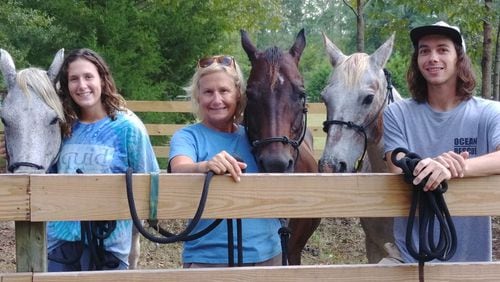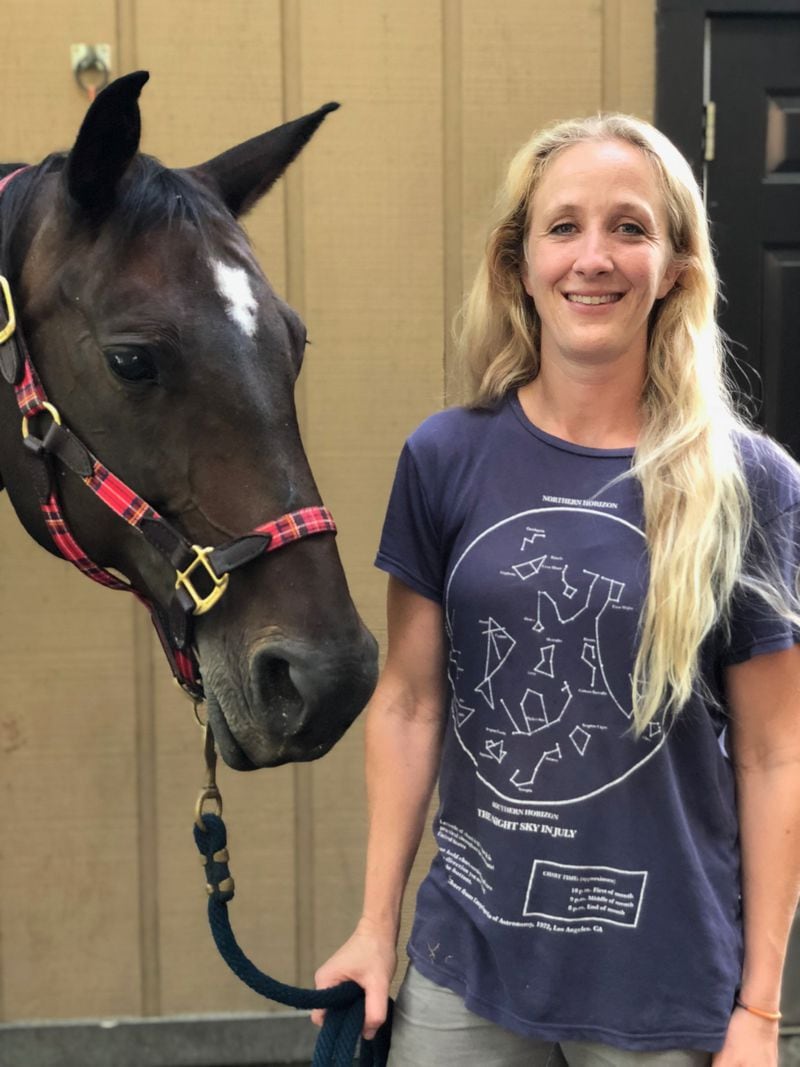Pam High of Wilmington, N.C., was not sure where she would move her three horses so that they would be safe from Hurricane Florence.
So her daughter, Morgan, quickly got on social media and found Cedar Rock Farm in Thomson, a family-owned farm near Augusta.
The Highs and Morgan’s boyfriend, Chris Halbert, loaded Thumper, Dixie and Maddy inside a trailer with their hay, feed and water and headed west.
“We could have stayed and weathered the storm, but I couldn’t imagine leaving my horses in those kinds of conditions,” said Pam High, a social worker whose husband stayed behind because of his job with an energy company.
“We’re so thankful for a place like this where we can come for shelter” she said.
Related: Hurricane evacuees are pouring into Georgia
They made the 5 -or -so-hour drive in wall-to-wall traffic. “Roads were closed,” she said. Their horses “did well, but it was pretty stressful driving with three horses in the back. We were happy, and they were happy when we got here.”
The storm is expected to be the fiercest to hit the Carolinas in decades, packing high winds, torrential rain and a dangerous storm surge.
It’s difficult enough to prepare a cat or dog for an evacuation. Imagine the challenge of moving an animal that can weigh well over 1,000 pounds.
Related: Georgians prepare to help those affected by Hurricane Florence
And for horse owners, the well-being of the animals are of paramount importance. They’re more than animals; they’re considered family.
Volunteers and rescuers, for example, worked to save horses from high flood waters that drenched parts of Texas during Hurricane Harvey. Some were abandoned by their owners who fled to seek shelter.
The owners of Cedar Rock Farm, David and Myrna Moore, aren’t charging evacuees like the Highs for access to their land. It’s such a close knit and supportive equestrian community that most stables, farms and fairgrounds aren’t charging people to board their horses and to camp out.
Related: North Carolina wild horses expected to survive Hurricane Florence
David Moore, whose family has owned the property since 1770, said he didn’t think twice about making the offer.
“We’re blessed to have (the farm), so why not share that blessing with others?”
Private stables and farms aren’t the only option.
State parks that have overnight equestrian facilities will allow visitors traveling with horses to use portable corrals and high lines (with tree saver straps).
There are still about 15 more sites available, for instance, at A.H. Stephens State Park’s equestrian facilities, said Curtis Glass, assistant park manager. He has fielded as many as 70 calls from horse owners on Monday from Virginia and the Carolinas. One man had just moved from New Jersey to Myrtle Beach. Another caller needed a place to keep her llama.
The park allows only domesticated horses who have a clear health certification.
The cost to stay in the Crawfordville equestrian area is $26 a night, and there are stables as well. Once the equestrian facility is full, the park will use the event field for overflow for “dry” camping. That area is free, but won’t have access to water and power.
Dr. Rose Coker, an equine veterinarian with West Georgia Veterinary Association in Carrollton, said an evacuation can be stressful for humans and horses. Some horses are used to being in trailers for a short time if they are being transported to a horse show or competition, but for some, the longer rides are stressful. An evacuation can involve horses spending hours standing up in a trailer in slow moving traffic.
Being in a new place with strange horses can also be stressful to the horse’s immune system, possibly resulting in ailments like colic, which can be serious, even deadly, in equines.
“Some horses don’t eat well when they’re away from home,” she said. “We encourage people who are evacuating to take their own feed, hay and water, if possible. Some horses won’t drink water that doesn’t smell like the water they’re used to. A horse used to well water may not drink city water. Dehydration is a factor.”
Earlier this year, Jenny Fudge of Marietta launched a website, gohorse.com, with more than 1,400 horse facilities in Georgia and over 8,000 nationwide.
More than 200 of them have changed their status to show “accepting evacuees.”
"It's crazy times right now, and we're trying to offer an organized solution," said Fudge, owner of Rebel Woods, a boarding facility. Her facility is prepared to take two horses at no cost, and she's received a number of calls from worried horse owners. "Most horses live in a pasture all day and every day. Then an evacuation hits. It's a big deal. These are their babies."
Tips for horse owners during an evacuation:
- Experts suggest horse owners have their animals microchipped and registered.
- Make sure you have access to truck and trailer or commercial transport; bring a week's supply of hay, feed and as much water as possible.
- Have an equine first aid kit ready at all times (including bandages, VetRap, wound salves and other necessarily items).
- Be sure horses are wearing halters (nameplates are highly recommended) immediately prior to the storm's approach. Write down your name, address and phone number, and wrap it securely around each horse's halter with tape.
- If you are not evacuating, fill all troughs prior to the storm's approach, and consider investing in 85-gallon tanks to transport water to pastures in the event of a power outage. Be sure to have a week's supply of hay and feed on hand in case stores are closed.
- If your barn isn't sturdy enough to withstand a storm, horses should be left outside their pastures.
- If your property is in a flood zone or is vulnerable to surge, do not tie horses up in stalls or in pastures. If your barn begins to flood, let your horses out immediately and as fast as possible.
Source: Showcase Properties of Central Florida
About the Author








